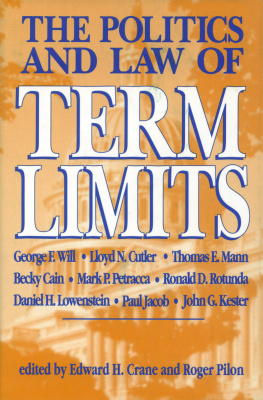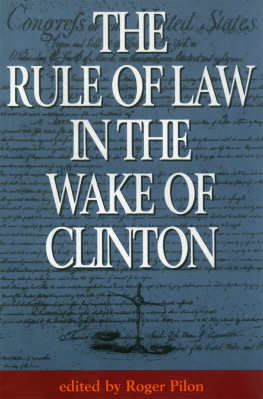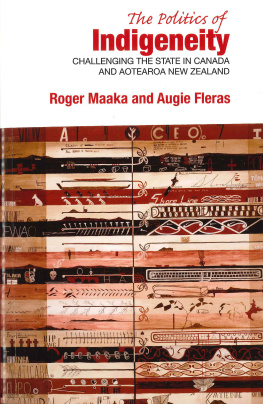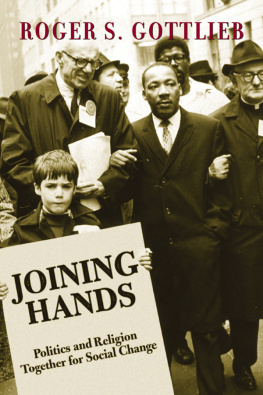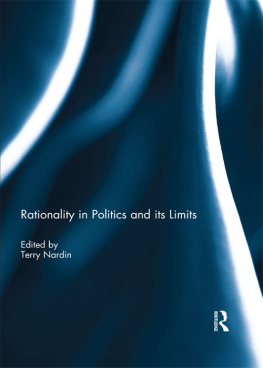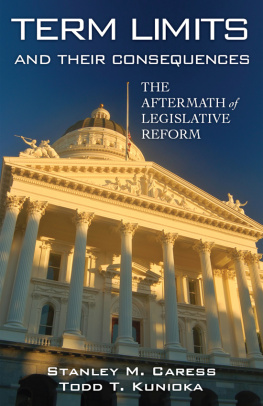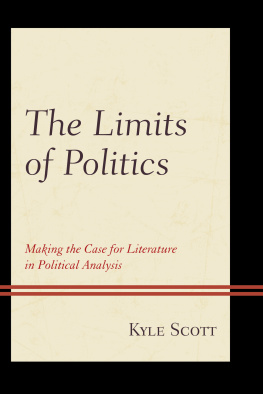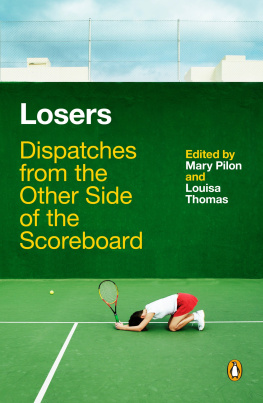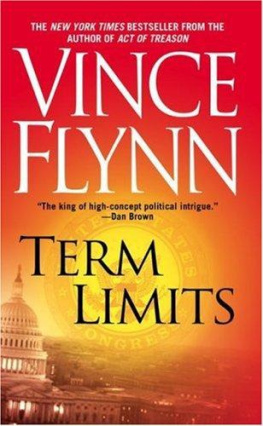
THE POLITICS AND LAW OF
TERM LIMITS
THE POLITICS AND LAW OF
TERM LIMITS
edited by
Edward H. Crane and Roger Pilon
INSTITUTE
Washington, D.C.
Copyright 1994 by the Cato Institute.
All rights reserved.
Library of Congress Cataloging-in-Publication Data
The politics and law of term limits: edited by Edward H. Crane and
Roger Pilon.
p. cm.
Includes bibliographical references.
ISBN 1-882577-12-4 (cloth) : $19.95. - ISBN 1-882577-13-2 (paper) : $10.95
United States. Congress-Term of office. I. Crane, Edward H., 1944- . II. Pilon, Roger.
| 328.73'.073-dc20 | 94-35217 |
| CIP |
Cover Design by Colin Moore.
Printed in the United States of America.
C ATO I NSTITUTE
1000 Massachusetts Ave., N.W.
Washington, D.C. 20001
1. An American Debate
Edward H. Crane and Roger Pilon
It is no overstatement to say that the term-limits movement-a national, grassroots effort to limit the terms of elected officials at all levels of government-is emerging as one of the most important political developments in this nation in a very long time. Reaching beyond such political staples as crime, economic policy, or welfare reform, term limitation speaks in fundamental ways to the question of how we will govern ourselves. Although the political establishment has often been slow, for understandable reasons, to acknowledge the movement, it can be ignored no longer.
Coming out of Middle America in September of 1990, when the voters of Oklahoma decided to limit the terms of their state legislators, term limits moved west in November of that year when California did the same while Colorado limited the terms of both its state and its federal legislators. Two years later, measures to limit the terms of federal legislators passed, often by overwhelming margins, in all 14 states in which they were on the ballot. With 7, and possibly 10, more states expected to follow suit this fall, voters in 16 states have now limited the terms of their state legislators, while hundreds of counties and cities, including New York and Los Angeles, the nation's largest cities, have limited the terms of their elected officials as well. As we go to press, a term-limits measure has just been certified for the ballot for this fall in Washington, D.C., which means that the term-limits movement has come at last even to the nation's capital.
But the movement has not been without opposition. Losing time after time at the polls, the political establishment that would be affected most directly by term limitation has sought relief in the courts, trying repeatedly to keep term-limits measures from the ballot, then to have those measures declared unconstitutional after the voters have spoken. Perhaps the most celebrated such effort, dubbed "Foley v. Voters," was a suit brought by Speaker of the House Thomas S. Foley, a 3O-year incumbent of the U.S. House of Representatives, to have the term-limits measure that Washington state voters passed in 1992 declared unconstitutional. That suit is now before the U.S. Court of Appeals for the Ninth Circuit.
In the meantime, the Foley case has been overtaken by another, a suit brought by a number of interested parties in President Clinton's home state of Arkansas to overturn the term-limits measure that 60 percent of the voters of that state had passed in 1992. When the Arkansas Supreme Court, in a split decision, struck down the provisions of that measure that limited the terms of the state's congressional delegation, U.S. Term Limits, one of the defendants in the suit and the leading national organization promoting term limits, immediately appealed the decision to the United States Supreme Court. On June 20,1994, the Court agreed to hear the case. Oral argument is scheduled for this fall.
To address both the political and the legal questions that the term-limits movement has raised, the Cato Institute's Center for Constitutional Studies held a conference on December 1, 1993, on "The Politics and Law of Term Limits." Drawing together some of the nation's leading experts on the subject, the conference featured both proponents and opponents of term limits and included heads of activist organizations, public policy analysts, and legal practitioners and scholars. The conference was aired nationally on the C-SP AN television network, and the spirited debate that ensued reflected, in our view, a prime example of the value of civil policy discourse. The essays that follow are based on the papers presented at the conference and are offered here in the spirit of continuing that debate.
The volume begins with an essay by the noted syndicated columnist and television commentator George F. Will, who may well be the nation's most visible proponent of congressional term limitation. A student of the American revolutionary period who originally was an opponent of term limitation, Will is a self-described American Tory who once wrote, "A great state can not be run by 'citizen legislators' and amateur administrators."
In recent years, however, George Will the Tory has become rather more George Will the Jeffersonian. The enthusiasm Will once had for the strong central government of the Hamiltonian vision-explaining his earlier opposition to congressional term limitation-is today directed toward a more populist vision that emphasizes the need for citizen legislatures if we are to have a truly representative democracy.
Although Will thinks the Founding Fathers were right to not include them in the Constitution, he writes of term limits that "what justifies them now is the nature of the modem state." With the advent of the "interventionist state" in the post-Civil War era, Will sees legislative service as increasingly attractive to those who would like to make a career in government, creating in tum a political class peopled by professional politicians who by definition represent something other than civil society.
Unlike many conservative supporters of term limitation who believe that the institution of limits will lead to a reduction of government meddling in society, Will reserves judgment on the point-suggesting even that the opposite might well prove true. He does believe, however, that respect for Congress itself will grow if the institution is seen by the public to be more a citizen legislature than a political ruling class.
As for measures to limit campaign giving and spending or to have the government finance campaigns-which opponents of term limits often propose as alternatives to term limits-Will finds those alternatives "facially unconstitutional." Moreover, such measures inevitably help incumbents, who already have such advantages as incumbency, name recognition, franking privileges, and free television studios.
Although Will reminds those who believe term limitation to be anti-democratic that America has "never flirted for a minute with untrameled majoritarianism," many term-limit proponents, while granting Will's point, nevertheless believe that term limits will enhance the democratic process. Most contested races, they point out, are for open seats, and the number of open seats will be dramatically increased through the term-limitation process, leading to greater voter interest and involvement in elections. George Will's opening contribution to this book is a persuasive case for term limitation from someone who is less interested in bashing Congress than in restoring respect to an institution that is fundamental to the limited, albeit important, sphere of human affairs subject to democratic rule.



